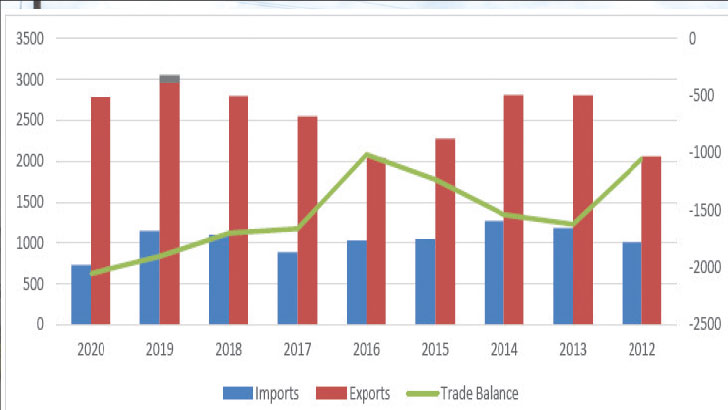Malawi trade balance up 6% in 2020
Malawi’s merchandise trade balance soured by seven percent last year to $2.05 billion (about K1.56 trillion) from $1.9 billion (about K1.48 trillion) in 2019, figures contained in the 2021 Annual Economic Report show.
The report, which is prepared by the Ministry of Finance, indicates that in 2020, exports grew by 36 percent to $1.15 billion (about K8.5 billion) up from $730 million (about K5.69 billion) in 2019.
Similarly, imports equally decreased by six percent from $3.05 billion (about K2.34 trillion) to $2.05 billion (about K1.56 trillion) in 2019.

This decrease in exports, according to the report, was due to effects of Covid-19 which affected returns from the country’s major exports such as tobacco which dropped by 20 percent, sugar by 9.7 percent and coffee and tea by six percent, respectively.
The report shows that Malawi’s export basket continued to be highly dominated by agricultural products with tobacco alone claiming over 51 percent.
Sugar and coffee exports claimed second and third slots with 10 percent and 11 percent share of total exports, implying that a basket of the three agricultural products accounted for over 70 percent of Malawi’s export products.
In terms of imports, the report shows that fuel was Malawi’s main import product with the latest available data showing that, as of June 2020, the product claimed about 32 percent of 2020 total imports, down from 40 percent recorded in 2019.
The product, together with other products such as telecommunication gadgets, pharmaceutical products, mechanical appliances, vehicles, animal and vegetable fats, second-hand clothing items, and plastics claimed over 60 percent of Malawi’s import basket.
Malawi’s wide trade deficit—the difference between imports and exports—has been a norm where imports outweigh exports despite the country having various trade policy interventions to narrow the gap.
Government is, however, upbeat that through implementation of the National Export Strategy II (NES II), which is anchored on industrial development through manufacturing of value-added products for exports, Malawi’s trade balance will improve.
Ministry of Trade is also developing the Malawi National Services Export Strategy (MNSES, 2021-2026) aimed at promoting services export.
Reads the report: “The strategy seeks to increase the production, value addition and competitiveness of Malawi’s labour and tourism by exploiting the country’s clear comparative advantages and export growth potential in the medium term whilst making efforts to export other services such as travel, ICT, transport, insurance and finance services in the long-run.”
Ministry of Trade spokesperson MayesoMsokera admitted that the Covid-19 pandemic affected volumes of trade between Malawi and its major trading partners who adopted measures to mitigate the spreading of the virus.





